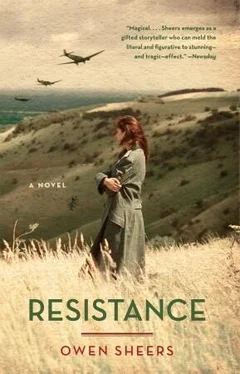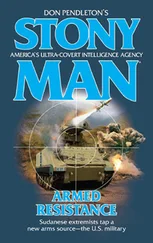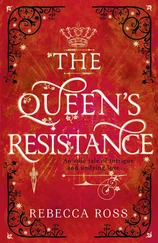Sarah
She placed the cap back on the pen, closed the accounts book, and put them both in the drawer of the dresser. The bottle of ink from which she filled the pen’s cartridge was already in there. Picking it out she tilted it to measure how much was left. It was almost empty, the deep blue liquid drained from the bottle just as she’d drained herself from these letters to Tom. It didn’t matter. The pages at the back of the accounts book had filled out over the months until now she was just a couple away from meeting the columns and figures of her previous life. She knew soon there would be no more room for the letters. Either inside the book or inside her.
When Alex arrived at Maggie’s farm on the morning of the show, the sky above the Hatterall ridge, which had, just a few hours before, still borne the last indigo streaks of dawn, was already ripening into an early summer blue. Maggie was already in the yard, washing the colt. The cobblestones about the horse’s legs were polished dark by the water running off his flanks and flecked white between them where the soapy rivulets trickled down to the drain along the fence. Glyndwr’s coat shone like a chestnut freshly split from its shell. Maggie worked over him with a towel, rubbing it in big circular movements over the slabs of muscle across his shoulders and rump. The horse lifted his head as Alex approached, pulling his tether tight before lowering his muzzle again to the calf nuts lying in the German’s outstretched palm.
“Don’t give him those now, mun. You’ll only excite him,” Maggie said.
Alex smiled back at her, not understanding yet understanding at the same time. A swallow darted from under the eaves of the stable. Alex followed its flight as it banked and carved above them, the blades of its wings, the cut throat of its chest, quick against the morning sky.
“Here,” Maggie said, throwing him a pair of red bandages. “I’ve chalked his socks. Put these on him to keep them clean. We’ll be off soon enough now.”
Maggie had been right again. Albrecht had, eventually, agreed to Alex accompanying her to the show in Llanthony. At first he was firmly resistant to the idea, reminding Maggie again of the consequences if their husbands, and therefore themselves, were linked to the insurgency in any way. But then Maggie had given him some facts and consequences of her own. The practicalities of keeping the farms going made it clear they could not continue with their isolation for much longer. At some point the seal on their estrangement from the world would have to be broken. Menna was already threatening to follow Bethan out of the Olchon and take her children back to the mining valleys. They were low on coal, and oil for the lamps. They would soon have no milk and therefore no cheese and butter. The lambs were to be slaughtered, the wool sold. In time someone was bound to come into the valley. Much better, surely, they choose when and how they make their contact with the world beyond? And anyway, Maggie told him, she’d be going to the show whatever he said. Unless of course the captain wanted to stop her by force.
In the end it was the poster that convinced him more than anything else. He recognised where it came in the arc of occupation. He’d seen similar posters during his time in Holland back in ’41. After months of nailing proclamations and orders to doorways and fence posts beginning with the word Forbidden and ending On Pain of Death , the administration would finally issue one like this. By Permission of the Office of the Reich Sub-Area Commandant for the Western Region ; the benevolent new rulers allowing local traditions and customs to continue. It was a subtle sign of strength, one of the finer points of Nazi technique. Gather together, it said, continue as you did before all this. We have nothing to fear and neither do you. There is no need for concern. Nothing, you see, has really changed. At the show itself there would still be soldiers, but in the background. Small groups of young men in grey green serge hovering at the edges of the marquees and stock rings. A friendly faced guard standing alongside the local woman taking the entry fees at the gate. Later, maybe some of these young men would remove their jackets and heavy boots and, trousers rolled to their knees, take part in the sports. They would laugh, make eyes at the young girls, and everything about them would say, “We are the same as you. It is nearly over now, this war. Let us be friends while we are thrown together.” Elsewhere on the show ground there would be stalls, even out here in the country: new women’s and mothers’ groups with slogans about “putting Britain back on its feet”; information desks about the opportunities of work in a new United Europe. Albrecht saw all of this in the yellow poster, quartered by creases where Sarah had folded it into her pocket. He recognised how it advertised much more than just the show. How it advertised victory too, a seal on the disruption of the war years. It was a sign that the world had moved on. “Why resist,” it said, “that which is already here? That which has only altered things for the better and brought you peace.”
Albrecht had known for some time that what Maggie said was true. Ever since the first days of the thaw. However much he may have wished it otherwise, he recognised they could not continue like this. He hoped it would last through the summer, through the diversions of shearing and hay-making, when the help of him and his men would be vital for the women. And maybe it still would. Maybe those letters he’d returned would be enough. But if the old woman was determined to go now, then so be it. She would not be stopped, and perhaps she was right; perhaps the time was already upon them. It was impossible to tell from intermittent radio reports alone. He could only be sure by testing the waters of the real world outside this valley, however much that might put them at risk. The world of hunger, boredom, resentments, fear, greed, and need. And that, in the end, was why he’d allowed Alex to appear at Maggie’s yard that morning. To run her colt, the colt Alex himself had come to love, but also to act as a barometer for Albrecht and the rest of the patrol. To take the measure of the pressures in that real world beyond the valley and gauge whether they could risk entering the erratic flow of its currents once more.
There were conditions. Maggie must enter her class, compete, and then leave. There was no need for Alex to appear until the showing itself. Indeed, until the colts were run, Maggie could handle the horse on her own. Alex must not speak to anyone. There was little danger of any of the units at the show recognising him, but the consequences of a German soldier dressed in a farmer’s clothes arriving with a local woman were obvious. It would be a disaster, for both Maggie and Alex. They would be seen as a collaborator and a deserter. For the duration of their time out of the valley, therefore, Alex would be “Arthur,” a mute cousin of William’s returned from the army to help on the farm. The residue of shell shock was the reason for his silence. When Albrecht heard himself outlining this scenario, he couldn’t help but feel ridiculous. Would anyone really believe such a story? Maggie seemed to think they would. She understood the consequences of Alex being found out and there was a forthrightness in her manner that eventually convinced Albrecht too. Even so, it was with a level of anxiety he hadn’t experienced in months that Albrecht watched the two of them leave Maggie’s farm that morning. They were no more than two specks against the hillside, and not much clearer through Steiner’s binoculars. But still Albrecht had watched them from the slope high above The Court, following their distant progress as closely as if they were a battalion of soldiers marching off to battle.
Читать дальше












